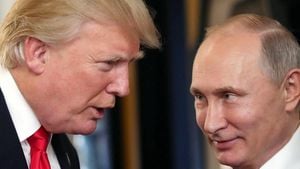Belarus emphasizes the importance of maintaining long-standing friendship with Estonia, as articulated by President Alexander Lukashenko during his congratulatory address on Estonia's Independence Day.
Celebrated on February 24, the holiday saw Lukashenko reaching out to the people of Estonia, highlighting the historical and cultural ties shared between the two nations. "We need to preserve and respect the heritage passed to us by our ancestors," he remarked, underscoring the significance of their longstanding friendship and mutual respect.
Lukashenko’s sentiments came at a time when relations between the two countries are fraught with tension. Notably, Estonia has taken a strong stance against Belarus, with its government pushing for increased sanctions from the European Union. This backdrop of diplomatic friction adds weight to Lukashenko's call for unity and collaboration.
Despite these barriers, Lukashenko expressed his conviction, saying, "I am confident, together we will overcome all temporary limitations for the prosperity and welfare of our states." His remarks reflect his steadfast belief in the possibility of renewed trust and dialogue, even amid the prevailing challenges.
He stated, "Cooperatively talking with neighbors even during contentious times is the most correct path," illustrating his approach to diplomacy as one rooted in openness and reconciliation. This call for dialogue stands as both a challenge and an opportunity, urging both sides to prioritize communication over division.
Yet, these words come against the backdrop of Estonia’s recent diplomatic actions, where it has been perceived as pursuing unfriendly policies toward Belarus. Tensions have escalated with calls from Estonian officials for the EU to bolster sanctions against Minsk, creating significant hurdles for the potential warming of relations.
The stark differences between the two nations are evident as Estonia attempts to maneuver the complex realities of the geopolitical climate, driven by its allegiance to Western alliances and security. Belarus, on the other hand, advocates for peaceful resolutions and collaborative efforts even during difficult interactions.
Looking forward, the dialogue between Belarus and Estonia remains complex, marked by differing outlooks on sovereignty, international alignment, and historical grievances. Lukashenko's appeals for friendship and mutual respect serve as reminders of what once was, calling for revisiting the threads of connection woven through their shared histories.
Both nations face the challenge of bridging significant political divides, yet Lukashenko's congratulatory message provides a glimpse of hope—a belief in the possibility of dialogue overcoming adversity. The next steps lie squarely with the respective governments and their commitment to fostering peaceful relations.
With both nations at historical crossroads, the wishes of their leaders may shape future engagements. Relations between Belarus and Estonia will likely be tested, but it is discussions steeped in trust and respect—qualities highlighted by Lukashenko—that may pave the way to more amicable diplomatic exchanges.
This situation highlights the broader theme of international relations, where underlying histories and contemporary policies interact to shape future possibilities.



